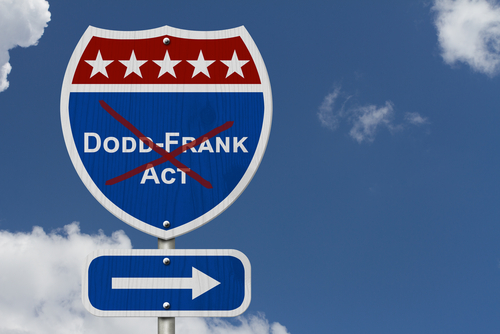The House passed the Financial CHOICE Act on Thursday, legislation that would overhaul many provisions of the Dodd-Frank Act and reduce regulations on financial institutions.

The Republican-led bill, sponsored by House Financial Services Committee Chair Jeb Hensarling (R-TX), passed 233-186.
Among its key provisions, the Financial CHOICE Act, which stands for Creating Hope and Opportunity for Investors, Consumers and Entrepreneurs, would repeal the Orderly Liquidation Authority, the emergency mechanism that allows large systemically important or “too big to fail” financial institutions to be liquidated through the FDIC. It also repeals the Financial Stability Oversight Council’s ability to designate non-banks as systemically important financial institutions (SIFIs).
The CHOICE Act would implement changes to the bankruptcy code to let large financial firms fail through the bankruptcy process.
The Financial Choice Act would allow banks to opt out of Dodd-Frank upon holding enough cash and limits federal stress tests of major banks to every two years.
Hensarling said community banks and credit unions deserve relief from “over-regulation.” Under the Financial CHOICE Act, banks and credit unions will qualify for regulatory relief if they elect to maintain enough capital to ensure that if they get in trouble, taxpayers won’t be forced to bail them out. Ninety-eight percent of the financial institutions that met the Financial CHOICE Act’s requirements for being well-capitalized did not fail during the financial crisis. Of those that did fail, none posed a systemic risk.
Further, the legislation would change the Consumer Financial Protection Bureau (CFPB) to the Consumer Law Enforcement Agency. The bill limits the agency’s power and mandates that its director is removable at will by the president. Its budget would be controlled by Congress.
It also repeals the Volcker Rule, which restricts banks from short-term proprietary trading of securities, derivatives, commodity futures and options on these instruments for banks’ own accounts.
And it abolishes the Office of Financial Research (OFR), which collects data and provides research for FSOC.
In addition, it would kill the Department of Labor’s fiduciary rule for financial advisors, creating a different best interests standard.
“Every promise of Dodd-Frank has been broken,” Hensarling said. “Fortunately, there is a better, smarter way. It’s called the Financial CHOICE Act. It stands for economic growth for all, but bank bailouts for none,” he said. “We will make sure there is needed regulatory relief for our small banks and credit unions, because it’s our small banks and credit unions that lend to our small businesses that are the jobs engine of our economy and make sure the American dream is not a pipe dream.”
U.S. Rep. Maxine Waters (D-CA), ranking member on the Financial Services Committee, blasted the bill.
“It’s shameful that Republicans have voted to do the bidding of Wall Street at the expense of Main Street and our economy. They are setting the stage for Wall Street to run amok and cause another financial crisis. I urge my colleagues in the Senate not to move on this deeply harmful bill.”
The Congressional Budget Office said the bill would reduce the deficit by $33.6 billion over 10 years and that the bill’s regulatory relief would benefit community banks and credit unions. The nation’s largest banks would be unlikely to raise enough capital to meet the bill’s requirement for substantial regulatory relief, the CBO reported.